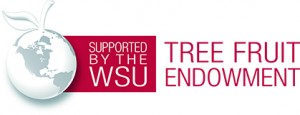NEWS
Getting the Greatest Return on your Investment and Sprayer
Written by Gwen Hoheisel, Regional Extension Specialist, Washington State University, March 2020 One of the most sustainable practices conducted in the orchard is to maintain and operate your sprayer properly. The environmental and social repercussions…

Crop Load Management: Back to Basics
A brief overview of your opportunities as growers to set yourself up for success in crop load management.
Cougar Blight Model
The Cougar Blight Model estimates the risk of fire blight infection during bloom by calculating temperature risk values which consider hourly temperatures and Erwinia amylovora bacterial growth rates and predicts potential infection events based on…
Good Vibrations: A potential IPM strategy for pear psylla (Cacopsylla pyricola)
Insects communicate in many forms like with chemicals in the form of pheromones, or with vibrations in the form of songs like in cicadas and grasshoppers. Pear psylla, Cacopsylla pyricola, uses both pheromones and songs…
WA Sterile Insect Release Project – Year Two Update
With increasing codling moth pressure, growers are looking for new management tools. Biological control released by drones is a fascinating possible solution. Betsy Beers and Kacie Athey, Washington State University Entomologists and Nathan Moses-Gonzales, M3…
PUBLICATIONS
Soil Health in Orchards
Orchard soil health, or soil quality, is the capacity of soil to support productive trees over time without negatively affecting the surrounding environment. Soil health is influenced by interacting biological, physical, and chemical properties of…
WORKSHOPS AND TRAININGS
Produce Safety Alliance Grower Courses
The Washington State Tree Fruit Association will hold a Produce Safety Alliance Grower Training course on March 31st, in Yakima and an FSMA Produce Safety Alliance Integrated Training course on April 1st and 2nd in…
OPPORTUNITIES
Notices
USDA-ARS Yakima ARL
EVENTS
TEAM
Datta Bhalekar
Thiago Campbell
Tianna DuPont
Dani Gray
Gwen Hoheisel
Marcella Magby
Lexie McDaniel
Manoella Mendoza
Claire Murphy
Bernardita Sallato
Tory Schmidt
Corina Serban

